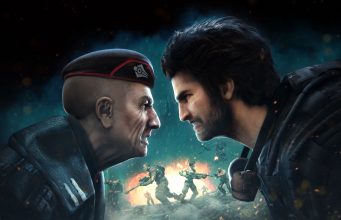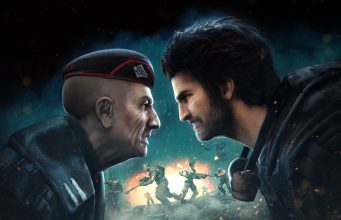

Bulletstorm (2011) is the sort of epic single-player shooter that’s all about running and gunning through an explosive linear campaign while chewing the fat with some wise-cracking sidekicks. It’s an interesting choice as a VR port; it has the promise of big set pieces and production value that should hold up well even 13 years later, but a lot of the moving parts just don’t fit together well in VR, which is a shame for such a frenetic, action-packed adventure.
Bulletstorm VR Details:
Available On: Quest 2/3/Pro, PSVR 2, PC VR
Reviewed On: Quest 3, PC VR (Quest 3 via Link)
Release Date: January 18th, 2024
Price: $40
Developer: Incuvo
Publisher: People Can Fly
Gameplay
If you’re like me, there’s a good chance you’ve played Bulletstorm before. While it didn’t make a splash on Xbox 360, PC or PS3 back in 2011, developers People Can Fly partnered with Borderlands studio Gearbox in 2017 to bring out a definitive ‘Full Clip’ remastered edition that fared much better among players across PC, PS4, Xbox One, and Nintendo Switch.
If you haven’t played Bulletstorm, here’s the setup: you have to shoot guys because of reasons which aren’t entirely important. What is important though is the skillpoint (SP) system that invites you to make stylish kills. The more stylish you can gank a dude, the higher the SP combo, and the faster you can upgrade the half-dozen guns you come across during the game.
And Bulletstorm’s skillpoint-driven gameplay offers a unique spin on the sort of linear first-person shooter campaign. As much as I wanted to love the VR version though, it just doesn’t hit the same as the flatscreen original. Its expectation of epic, overblown action lacks the sort of fluidity I’d hoped for, which makes it feel significantly more tedious than it ought to be.
Here’s why: the game’s combo system invites quick, frenetic sliding, kicking and shooting. The ideal combo involves using your trusty energy leash to grab an enemy with your non-shooting hand, thereby putting him into slow-mo, then quick kicking and/or shooting him to death—oftentimes into a one-off contraption that gives you a massive bonus, like a giant grinding wheel or pit of molten metal. It’s designed to be a fluid chain of events that eventually get you into a sort of flow state of leashing, kicking and blasting dudes. In a headset though, this feels decidedly more stilted than if it were designed for VR from the ground up, which slows down nearly every interaction to a crawl. More on that in the Immersion section below.
With development started in 2007, Bulletstorm is undoubtedly a product of its time. At the very beginning of the VR version of the game you get a big disclaimer about the sort of controversial language and adult themes it has, as dialogue is basically unchanged from the original. It’s the sort of banter you’d expect from a 14-year-old in a COD lobby (minus the flagrant racism), so take it for what it is.
Beyond that, the game has definitely aged in terms of ancillary game mechanics. Even on flatscreen, nowadays people crave more involved weapon upgrade systems that give them more control over their shooting experience. In 2024, Bulletstorm’s upgrade system just doesn’t make me feel like the juice is really worth the squeeze when it comes to executing artful kills. Earning that SP and spending it to max out guns magazine capacity and secondary charge ability—the only two upgradeable elements of any gun—just doesn’t feel sufficiently rewarding to make me really want to engage with the system at all in any meaningful way. Sure, it’s cool to toss a dude into a giant grind wheel or vat of molten metal, but if it doesn’t consistently reward you beyond the first initial wow-factor, then you’ll be less inclined to seek out those moments throughout the five-hour campaign.
Besides the full campaign, there is no co-op or multiplayer of any kind for now. The only bonus is two tacked on missions featuring Trishka Novak and her energy blade, which felt so overpowered you can easily just waggle-slice your way through willy nilly until you’re threaded back to the main campaign again.
Immersion
It pains me to say this about a game I loved on flatscreen, but from the get-go Bulletstorm VR is uglier than I hoped it would be. Don’t get me wrong, there are a ton of potentially interesting set pieces throughout, although on Quest 3 the game seems de-mastered rather than something belonging in 2024. Despite showing off slightly tuned-up aesthetics on the PC VR version (via cabled Link), which includes dynamic lighting and tighter visuals overall, the game still oscillates between being crisp and visually dense to low poly and downright muddy.
As an older game from a different era, you’ll also notice the usual inconsistency when it comes to things like objects clipping through one another and buggy AI pathfinding, which may not be such a big deal on flatscreen but is pretty glaring in VR. It is what it is.
For the uninitiated, much of the game’s fun on flatscreen is quickly covering area by sliding around, getting up close to a bad guy and kicking him, landing multiple combos and reaping the high score reward. Sliding however doesn’t feel very intuitive in VR as a single button input, and would have been better mapped to a more immersive movement. This leads you to running around most of the time, which lacks the same flair and flow.
As for shooting, the game has been suitably updated to allow for multiple reload styles, including more involved magazine reloads that require charging the handle of the gun to simple single push-button reload. I appreciate the choice here, although I actually had a lot more fun with the least immersive reloading style, as the action is clearly paced for fast and mindless running and gunning. Faffing about with a magazine just doesn’t feel right in the context of aspiring to fluid chain-kill combos.
The energy leash also feels pretty great in VR, letting you either use your hand to target and whip enemies towards you. What doesn’t feel great though is having to press forward on the ‘R’ to kick, which elicits a disembodied foot to mindlessly kick forward. This is a key mechanic that likely wouldn’t find its way into any modern VR game since it’s such an obvious immersion breaker. I feel like this too could have been mapped to a more immersive movement instead of relying on straight button inputs.
And yes. There are a million cutscenes. Non-VR games from this era are littered with them, so there’s very little you can do about that since they’re pre-rendered and baked into the game as 2D videos. You watch these in black virtual theater, although there’s also a more immersive VR mode which forces video it into a sort of fake 3D version, which isn’t recommended considering how choppy and crappy it is.
While you might expect me to come down on the game’s irreverent dialogue, it’s really just a product of its time, for better or worse. Still, you can’t deny its objectively great voice acting, a majority of which is thanks to grizzled protagonist Grayson Hunt, which is voiced by Steve Blum, who is also known for voicing Spike Spiegel from Cowboy Bebop, Ares in God of War and Wolverine from Marvel’s Wolverine (among many other credits).
Comfort
For all its ills, Bulletstorm VR is mostly comfortable, offering all manner of locomotion styles and VR comfort modes to get you moving at a fast clip. And the ‘sprint’ movement is very fast, which could cause discomfort in some users. While mostly smoothed over for VR, there are a few less than comfortable experiences, namely a cart ride that follows a very blocky track that jerks you from side to side.





